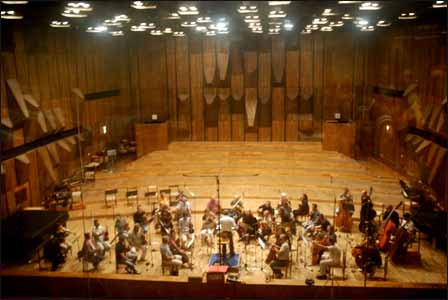|
Click here to return to the main site. Stuart Hancock (Composer) - Hawk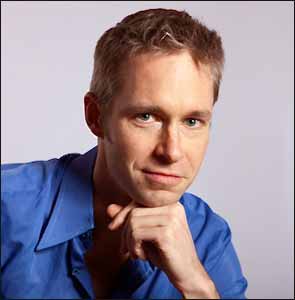 Stuart Hancock was born in 1975. In 1998 he graduated with distinction from the Masters course in composing for film and television at the London College of Music. Between 1999 and 2005, he worked full-time with London music production company Mcasso, where he composed and produced music for all commercial media. He now works as a busy freelance composer and orchestrator of film, television, commercial, theatre and concert music from his studio in north London. He has scored many films, both shorts and features: most notably EMR. Hancock's soundtracks to four recent films - Hawk, Underground, Bodyguard: A New Beginning and One Night In Turin - have been recently released on CD and to download. Darren Rea spoke with him as his score for Hawk was released through Moviescore Media... Darren Rea: How and why did you first get interested in music and when did you realise that you could make a career out of it?
Eventually I tried to write my own music, which I sort of dabbled with at school. I didn't take it seriously and didn't do A Level music. I did a Geography degree and took it seriously after that. I didn't think there was going to be any career for me in Geography. I did a one year's Masters degree at the London college of Music and then I got a lucky break, I got a full time job in Soho doing jingles. DR: Do you think that music is still an important part of children's lives now, especially as so much of their time seems to be spent playing video games, as it's traditionally been? SH: I think it's still pretty strong in the UK. I do a lot of piano playing work, in the music colleges, and some of the talent out there is immense. There are a lot of kids still coming through. The school I went to is a stronger music school now than when I went there. DR: On your website (stuarthancock.com) you've got some great show reel pieces. I really loved Concerto for Two Flutes & Orchestra, Concerto for Violin and Orchestra and Raptures. Do you know if these will ever be released to buy?
Rapture has had several performances, so that's had a bit of a life, but as far as proper studio recordings and releases or publishing... it's a really hard nut to crack, the classical market. I've tried and tried but it's harder than film and it doesn't really pay. So, as far as my concert composing goes, although it's very fulfilling to write that stuff, and have wonderful live recordings, it's not something I'm actively really pursuing now. Unless you have a very wealthy benefactor, or you're writing the sort of music you wouldn't want to write, you can't really make a living from it. Some contemporaries of mine write very avant-garde guard music and they're doing very well out of it... DR: Your latest soundtrack for the short film Hawk has just been released. How did you get involved with that? SH: When I was working at Mcasso, one of my colleagues there knew [director M J McMahon] and I think she got talking to him at Cannes one year. We first met about eight years ago and he only had concept art at that stage, but it had huge ambition and I was pretty impressed with it. A couple of years after that it was shot and shortly after that the first thing I did on the project was score a trailer that they'd cut. The recording we did was in 2007 so it's been a long term project. It's spent the last four years in post production. It's one of these things where there's very little money involved and everybody that's involved, although they're all professionals in their own right, they're all doing it in their spare time, and sort of grabbing studio time as and when they can. DR: For most of your movie projects are you usually hired once the film's finished?
A couple of review I've read of the Hawk soundtrack have made the point that the final track on the album is wonderful, but everything leading up to it is atmospheric, too bland and not quite fully fledged in the way that the final track is. But that's kind of because most of those cues are just doing a job. They're there enhancing what's going on on the screen and not overwhelming. It's a fine balance to strike. DR: Do you normally start work with a blank canvas and watch the movie and decide with the director where the music will go? Or is there generally already a temp track on there and you have to replace that with your own score? SH: Yeah, the latter. That's how most director's I've worked with tend to work. Obviously they're flexible as well around that. In the case of Hawk, the editor had cobbled together a really good temp track, which in a way was a bit of an obstacle to improve on. He'd taken an awful lot of The Lord of the Rings music and placed it in there. The first cue they had was one of the main tracks from The Island soundtrack. They were absolutely in love with it and I went through umpteen version of my music to confine that one to the cutting room floor and replace it. So, it's good in a way that temp tracks allow a director to express what he wants to get from the music, but sometimes it can be a struggle to come up with something that's different enough but at the same time conveys the same emotion for that scene. DR: Of all the areas you've worked in - film, TV, advertising and theatre - where are you most at home?
Commercial music has its rewards, financially, but ultimately it leaves me a little bit cold sometimes. Whereas if I can contribute to a good film with a good score... that's my bag. DR: What's the one standout project that you're most proud of? SH: I'd have to say Hawk. Even though I did it a while ago, it's still music I'm pretty proud of. It sounds more expensive that it was. It was the first time I went to Eastern Europe to work with the orchestra there - it's an orchestra I've been back to work with several more since. The whole process of putting that score together was good fun. We used a really good choir as well. Another project I'm quite proud of is One Night in Turin which was a very emotional project to work on because of the subject matter. DR: So far we've reviewed your scores for Underground, One Night in Turin, Bodyguard: A New Beginning and Hawk and for me your music takes me back to John Williams's work in the '80s - the stuff I loved as a kid. How much has Williams's work been inspirational to you?
One of my recent favourites of his is Minority Report. It's so very John Williams, but it's a bit updated. He's using a more modern sound but he's still a master of capturing whatever he needs to in the music. Jerry Goldsmith, as well, is another huge inspiration. I caught the last ten minutes of Basic Instinct on TV recently, and while it's not in my list of top ten films, the music really heightens the experience of what you're seeing. The final scene in The Boys From Brazil, another Goldsmith score, is heightened by the music too. So yes, Goldsmith and Williams - legends. DR: If Hollywood came to you tomorrow and said they're going to make a movie of your life who would compose the soundtrack? SH: [Laughs] What a question... er... Well, why not go for the best, John Williams. If you can afford him. DR: What music do you tend to listen to?
DR: If you got bored of music tomorrow what would be your ideal job, if money wasn't a problem? SH: It would still be in music. If money were no object... I'd offer to do movie scores for free. DR: What are you working on at the moment? SH: I've just finished off the music on the news Pimms commercial for the summer which is a rearrangement of 'The Liberty Bell' march. I've got a couple of pitches on other commercials, and the other main thing I'm working on is I'm writing music for a silent Buster Keaton film. That's for a concert performance and I'm currently orchestrating that.
The soundtrack to Hawk is released through Moviescore Media from 05 April 2011. This interview was conducted on 03 May 2011 Return to... |
|---|
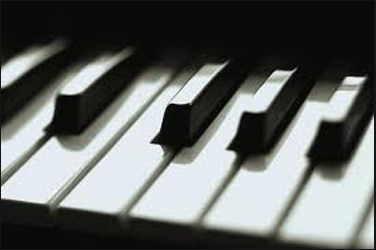 Stuart Hancock: I learnt the piano at the age of eight at school and then picked up the violin as well at ten. Originally, prior to that, I had a cousin who was a pianist and I was in awe of him playing piano and just wanted to do that for as long as I can remember.
Stuart Hancock: I learnt the piano at the age of eight at school and then picked up the violin as well at ten. Originally, prior to that, I had a cousin who was a pianist and I was in awe of him playing piano and just wanted to do that for as long as I can remember.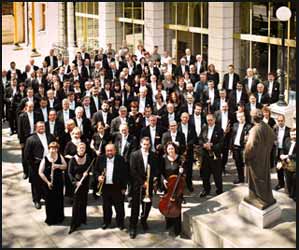 SH: No, there's no plans for that. [November 2019 update - Raptures is now available to buy on CD and contains 'Raptures - Suite for Orchestra' and Concerto for Violin and Orchestra'. Read our review
SH: No, there's no plans for that. [November 2019 update - Raptures is now available to buy on CD and contains 'Raptures - Suite for Orchestra' and Concerto for Violin and Orchestra'. Read our review 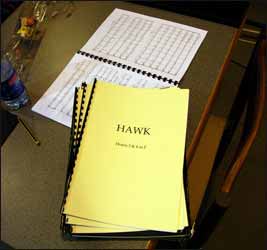 SH: Usually, yes. Hawk was unusual in that respect. I was brought in at the script stage, which is fairly unusual. It's usually the last thing that they think about and the last thing that they have money for... or not, which can be frustrating [laughs]. Then you're typically expected to turn it around very quickly. [Laughs] I'm painting quite a glum picture of it all, but it tends to be how it happens.
SH: Usually, yes. Hawk was unusual in that respect. I was brought in at the script stage, which is fairly unusual. It's usually the last thing that they think about and the last thing that they have money for... or not, which can be frustrating [laughs]. Then you're typically expected to turn it around very quickly. [Laughs] I'm painting quite a glum picture of it all, but it tends to be how it happens.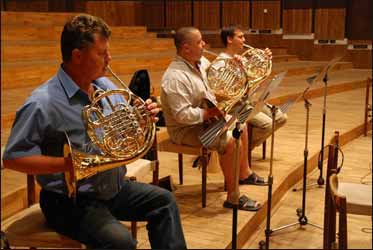 SH: Film. It's a very satisfying medium to work in, when it's right. I adore the story telling of it, particularly something like Hawk, which was a joy to work on. There wasn't a lot of dialogue in the film and the music was very much a story telling side of the film, a very crucial player.
SH: Film. It's a very satisfying medium to work in, when it's right. I adore the story telling of it, particularly something like Hawk, which was a joy to work on. There wasn't a lot of dialogue in the film and the music was very much a story telling side of the film, a very crucial player. 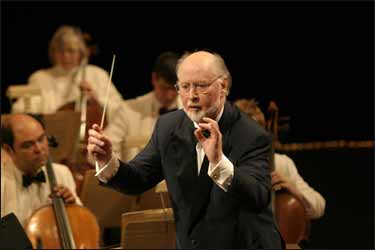 SH: I'm the same, I grew up with the same music. Star Wars, Superman, Jaws, Indiana Jones... all that stuff. Just awesome scores and wonderful films as well. It was a pretty golden age. He's an absolute god in my eyes. He's not the only one, but he's the main man. I take a lot of inspiration from him.
SH: I'm the same, I grew up with the same music. Star Wars, Superman, Jaws, Indiana Jones... all that stuff. Just awesome scores and wonderful films as well. It was a pretty golden age. He's an absolute god in my eyes. He's not the only one, but he's the main man. I take a lot of inspiration from him. 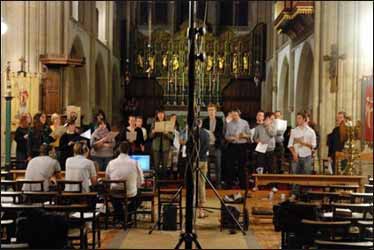 SH: I usually just put the radio on. I don't listen to enough music primarily because sometimes you just want to switch off and if you've been working on something all day the last thing you want to listen to is more music. Generally in the car I'll have Radio 1 on or Capital.
SH: I usually just put the radio on. I don't listen to enough music primarily because sometimes you just want to switch off and if you've been working on something all day the last thing you want to listen to is more music. Generally in the car I'll have Radio 1 on or Capital.